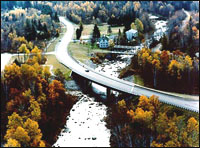Folks who paid close attention to the speeches of New Hampshire primary victor John Kerry in recent weeks would have noticed an emphasis on MTBE — a gasoline additive that makes fuel burn more efficiently and cleanly, but is suspected to be carcinogenic* and widely known to contaminate groundwater. To outsiders, this may have seemed like a strange environmental issue to spotlight — why not focus on global warming, say, or species extinction?

New Hampshire wants its rivers to flow MTBE-free.
Photo: U.S. DOT.
But MTBE is an issue with considerable political resonance — not only inside the Beltway, where it was the major sticking point that stymied passage of Bush’s energy bill last year, but also in New Hampshire, a state that has been disproportionately hit with MTBE contamination in its drinking water, lakes, and rivers.
New Hampshire considers its contamination problem so bad, in fact, that in October, the state sued 22 MTBE producers, claiming that the fuel they sold was a “defective product” that has spoiled state waters. The state demanded that the companies reimburse it for the millions of dollars shelled out to investigate and crack down on MTBE pollution.
Kerry has encouraged the state’s efforts: During a recent stop in Salem, N.H., a town struggling with MTBE contamination, Kerry elicited hearty applause when he declared, “As president, I will stand up for the principle of polluter pays and I will stand with states like New Hampshire who are seeking reimbursement for the environmental damage caused by powerful corporations. And in a Kerry administration, we will ban MTBE — for good — and for the good of America’s families!”
But Kerry wasn’t the only one who jumped on the issue. Last week, in the lead-up to the New Hampshire presidential primaries, Bush’s EPA lobbed a cherry bomb into the MTBE debate, promising to accept a preliminary version of New Hampshire’s request to be exempted from a federal program under the Clean Air Act that requires gasoline to contain fuel additives that make it burn more cleanly. MTBE is the primary or sole additive used in New Hampshire and a number of other states.
Bush critics viewed the move as an effort to neutralize one of the Democrats’ issues in the primary campaign, and sensed other motives as well. “This is one of the most blatantly political decisions I have ever seen from the EPA for a number of reasons,” said Frank O’Donnell, executive director of Clean Air Trust, “not the least of which is that the EPA rejected a similar request made in 1999 by then-Gov. Gray Davis [D] in the state of California for a waiver from the [fuel-additive] requirement.”
The EPA says that California failed to come up with a viable alternative plan to offset the air pollution that MTBE prevents. But the pollution-offset program proposed by New Hampshire seems half-baked at best, according to O’Donnell. “Their plan seems to be very vague … a bizarre solution” that calls for emission reductions from consumer products such as paint and hair spray to make up for increased emissions from autos, he said.
Enviros also argued that the EPA decision would do little to alleviate New Hampshire’s MTBE-related problems. Very few gasoline suppliers are making non-MTBE fuel blends that could be easily piped to New Hampshire, according to Kent Finemore of the air resources division of New Hampshire’s Department of Environmental Services. And there aren’t likely to be many suppliers willing to make a special gasoline blend exclusively for New Hampshire’s small market. “Frankly, this EPA decision is probably not going to improve our [MTBE] predicament that much because it won’t change what we get in terms of gasoline,” said Finemore.
Nor is the decision going to convince New Hampshire to drop its lawsuits and let MTBE-producing companies off the hook. New Hampshire Gov. Craig Benson’s (R) office issued a statement saying that he was pleased with the EPA’s decision, but the state is still expected to aggressively pursue its lawsuits against MTBE-makers.
So what will the EPA’s move achieve if not cleaner waters in New Hampshire or indemnity for the oil companies? It may give just the needed boost to Bush’s notorious energy bill, which stalled out in Congress late last year but which the administration will again be aggressively pushing in the coming weeks. Here’s why: New Hampshire Sens. Judd Gregg and John Sununu, both Republicans, have been staunch opponents of the energy bill — largely because of vehement concerns about MTBE in their home state. The rumor on Capitol Hill is that Gregg and Sununu made a deal with Republican leaders that they would not filibuster the energy bill if the EPA granted the state’s request for a fuel-additive exemption.
10 Things I Hate About You
Three weeks ago, more than a dozen top-level Bush appointees and Republican members of Congress convened in Phoenix, Ariz., with energy, mining, and manufacturing executives for a “Mulligans and Margaritas” political fundraiser, immediately followed by a conference where paying attendees were invited to help the politicians pin down their policy priorities for 2004. The canoodling was organized by the U.S. Chamber of Commerce and the Western Business Roundtable, both powerful industry groups. Honored guests included Deputy Interior Secretary Steven Griles, EPA Assistant Administrator for Air Jeffrey Holmstead, and Sen. Pete Domenici (R-N.M.), chair of the Senate Energy and Natural Resources Committee.

For Pete’s sake.
Photo: U.S. Senate.
The invitation to the event opened with the question, “Want to help Congress write its ‘To-Do’ list for next year??” and went on to advertise a gathering “at the historic and luxurious Arizona Biltmore Resort … [where] you’ll get to participate in a work session with members of Congress in developing a ‘Top Ten To-Do List’ for Congress.” The Western Business Roundtable also sent out a survey to its constituents to get a more authoritative picture of their top 10 political concerns; in the end, more than 300 business leaders participated.
On Tuesday this week, the results were released: While a mere 9 percent of top business leaders from across the West judged the fight against international terrorism to be the No. 1 concern, more than twice that number — 20 percent — said that Congress’s top priority for 2004 should be passing Bush’s energy bill. Coming in at a close second was reforming the Endangered Species Act. Other top picks included reforming the National Environmental Policy Act, expanding access to public lands, and reforming the Clean Air Act.
“These results should come as no surprise to anyone who lives and works in the West, as these are crucial issues that touch virtually every citizen on a daily basis,” said Jim Sims, executive director of the Western Business Roundtable. “Clearly, some of these represent very significant challenges for the Congress and will take several years to complete. But the West is increasingly getting organized to press its case in the Congress. I am optimistic that the Congress will make progress this year on a number of these fronts.”
Sims was particularly vehement about the need to alter the Endangered Species Act, which he said “is flat-out broken — it doesn’t work. … Environmentalists are not interested in using this legislation to recover the species [already listed as endangered] — they just want to add more to the list to throw more and more obstacles in the way of economic progress. Why can’t they just focus on the species already on the list?” Sims had similar thoughts on NEPA, which he characterized as another environmental “hammer to smash progress — any kind of progress!” Progress, in his mind, correlates pretty closely to increased oil, gas, and coal extraction: “People in the West realize that this region is in [economic] trouble without more aggressive plans for energy development — that’s a no-brainer.”
Sims adamantly denied that the Jan. 7 political fundraiser in Phoenix was in any way related to the subsequent conference where business chieftains drew up marching orders for Congress — even though both events were sponsored by the same groups and hosted at the same resort.
“But I make no apologies for helping our members influence political candidates on Western issues!” he said. “That is the definition of the democratic system in the first place — people need to stand up for their own interests. In fact, more people need to engage in this kind of political process.” That is, if they’ve got a seersucker suit for the golf course and a spare $1,500 for Republicans’ congressional campaigns.
Rollback and Forth
U.S. EPA chief Mike Leavitt tried to put a happy face on the Bush administration’s environmental agenda this week when he joined auto-industry kingpins at a glitzy media event in D.C. on Monday to celebrate a new generation of cleaner cars and fuels.
But, true to form, this past week has also seen the administration push out a steady stream of what environmentalists like to call “rollbacks” — and Bush acolytes like to call “common-sense reforms”:
- On Jan. 22, Interior Secretary Gale Norton galled environmentalists when she approved a plan to open nearly 9 million acres of pristine land on Alaska’s North Slope to oil exploration and drilling — an aggressive effort to tap new energy sources in the region in the wake of the administration’s failure to get their mitts on the Arctic National Wildlife Refuge.
- In a smaller but still significant move, the U.S. Forest Service opened 6,400 acres of federal land in Michigan’s Huron National Forest to natural-gas and mineral-resource development. A Michigan company is already preparing to conduct a seismic survey using small explosives in the area.
- The Forest Service also green-lighted a plan to triple logging levels in California’s Sierra Nevada mountains as a “fire-prevention strategy.” The plan officially jettisons many of the environmental restrictions governing tree removal and allows the cutting of old-growth trees up to 30 inches in diameter. Environmentalists are concerned that the logging will destroy the habitat of threatened and endangered species including the northern spotted owl, Pacific fisher, and willow flycatcher.
- Last but not least, the EPA opted to reduce the monitoring requirements on smokestack emissions — making testing rounds fewer and farther between — after industry groups sued the agency for requiring them to do more testing than the Clean Air Act mandates. Critics countered that expanded testing efforts are crucial and that fewer air-polluting scofflaws will be busted if emission levels are measured less frequently. Of course, that might suit the Bush administration just fine.
*[Correction, 30 Jan 2004: This article originally referred to MTBE as a carcinogen. It is more accurate to say that it is suspected of having cancer-causing properties.]


